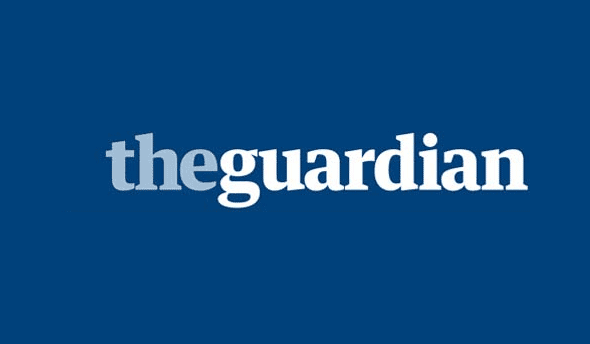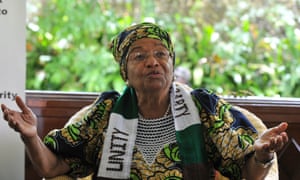NEWS
September 26, 2014

IN BRIEF
This article was originally published by The Guardian. By Robtel Neajai Pailey and Blair Glencorse Liberia’s president, Ellen Johnson Sirleaf, has told aid donors ‘we must shorten the road from commitment to cash’. Photograph: Issouf Sanogo/AFP/Getty Images Friday 26 September 2014 16.01 BSTLast modified on Thursday 2 February 2017 12.52 GMT Stately and unassuming, Liberia’s national Ebola taskforce coordinator James Dorbor Jallah announced at a press conference in late August that the government’s initial $5m (£3m) contribution to contain the disease had been spent. As he fumbled with the numbers in his expenditures report, the blogosphere exploded with queries about how all that [...]
SHARE
This article was originally published by The Guardian.
By Robtel Neajai Pailey and Blair Glencorse

Stately and unassuming, Liberia’s national Ebola taskforce coordinator James Dorbor Jallah announced at a press conference in late August that the government’s initial $5m (£3m) contribution to contain the disease had been spent.
As he fumbled with the numbers in his expenditures report, the blogosphere exploded with queries about how all that money could vanish so quickly. Now, the Liberian Senate is demanding full disclosure of the Ebola funds’ whereabouts. To his credit, however, Jallah was attempting something that donors have yet to do: answer to the people in whose name “the war on Ebola” is being fought in west Africa. As we have seen all too often in international emergency response operations, the stakes are too high to forgo systems of accountability.
Médecins sans Frontières, the leading health relief organisation in Liberia, has complained for weeks that resources committed to the Ebola crisis have been “entirely insufficient”. The latest projections from the UN indicate that almost $1bn will be needed to contain the Ebola outbreak in west Africa. Significant amounts of money have now started pouring in, with the fanfare we have come to expect in such situations. But commitments have not been matched with relevant tools and reports to track the flows of promised aid disbursals.
Last week, the Pentagon announced that it will divert $500m towards the Ebola relief effort. Last month, the EU announced €140m would be spent on treatment centres, the training of healthcare workers, mobile laboratory services, as well as budget support in the affected countries. The World Bank approved a $105m grant to help communities cope with economic hardship, among other challenges, and the WHO launched a $100m response plan.
Donald Kaberuka, president of the African Development Bank, recently travelled to Sierra Leone and Liberia in a gesture of solidarity to pledge $60m, which he said would be channelled through the WHO for disease surveillance, case management, logistical support, and capacity building. The Bill and Melinda Gates Foundation followed suit by pledging $50m to support the UN and other international agencies.
Yet, as donors muscle their way to the front of the pledge line, they must account for how their aid is actually disbursed, managed and reported. Beneath the veneer of international humanitarianism lie fundamental questions about the accountability of aid.
It is in times of emergency in recent years that the lack of accountability has been most apparent. More than four years after the earthquake in Haiti – and with a central role played by several former US presidents in coordinating relief efforts – it is hard to clarify exactly what happened to the $9bn in emergency aid. For example, one review indicates that only 0.9% of the more than $1bn pledged by USAid after the disaster has actually gone to Haitian organisations; while another US government report (pdf) indicates that as of last year only 35% of pledged funds had actually been disbursed. Meanwhile, thousands of Haitians displaced by the disaster continue to live in makeshift housing, squalor and destitution.
The aid industry is often criticised for its lack of openness and effectiveness. While progress is being made – through efforts like the Aid Industry Transparency Initiative, for example – more must be done in times of crisis. Before demanding that west African governments report to their citizens, donors must prove that they too can remove bureaucratic red tape and spend relief aid judiciously and expeditiously. As the president of Liberia, Ellen Johnson Sirleaf, has repeatedly pointed out to donors, even before the recent Ebola outbreak, we must “shorten the road from commitment to cash”.
In west Africa, we must act now to avoid the problems of past humanitarian relief efforts. Donors should embrace lessons from previous emergencies such as the Asian tsunami, including the need to emphasise local ownership, ensure participatory efforts, make transparency a priority, build capacity to manage funds and handle complaints effectively.
When Ebola is fully contained – and it will be – donors and west African governments at the centres of the outbreak must also conduct relief aid audits to quell any lingering doubt about the money trail. The government of Liberia has already begun discussions around the idea of a multi-agency special taskforce to monitor corruption within Ebola funding streams, which is a step in the right direction.
The people of Guinea, Liberia, Nigeria and Sierra Leone deserve to know the difference between who pledged to help them and who actually delivered. They deserve to know how much has been spent on expensive consultants or administrative overheads versus practical relief supplies. They deserve to know what amount, if any, has built sustainable national health infrastructure, compensated local medical personnel for their service, and contributed to scientific research to find a cure for Ebola.
Most of all, they deserve to know that the response to their suffering is effective, transparent and accountable. This is the very least we owe them.
